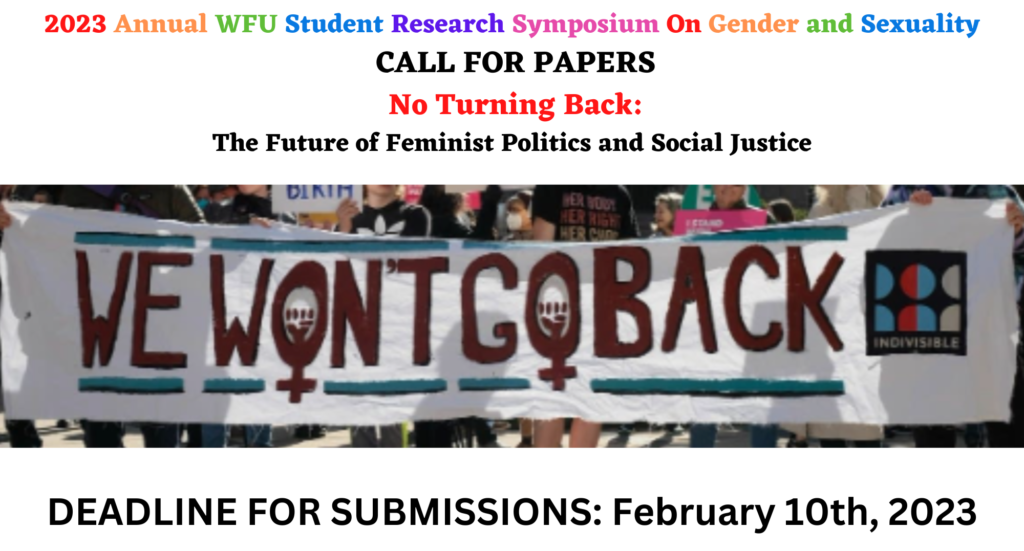2023 WFU Student Research Symposium

For the 11th year of the annual student research symposium on gender and sexuality, Wake Forest University (U.S.) is partnering with University of Georgia (U.S.) and Sant’Anna Institute (Italy) to organize a colloquium (on March 17th, 2023) that will feature moderated virtual sessions of scholarly and creative presentations by graduate and undergraduate students. Taking advantage of the generally wider access to digital platforms, the symposium will enjoy the benefit of international collaborations. Undergraduate and graduate students from institutions around the globe are invited to attend virtually and participate in this symposium to allow us to showcase the exciting work that they are undertaking on gender/sexuality-related issues across disciplines.
This year’s theme of “No Turning Back: The Future of Feminist Politics and Social Justice” was prompted by a series of shock waves produced by pressing social, political, and ethical questions that have entered our global lives and our local college campuses in the last few years. While the ravaging course of the Coronavirus pandemics and the fight against systemic racism are still ongoing, the overturning of Roe v. Wade has revoked the constitutional right to seek safe abortion care, disproportionately affecting the reproductive lives of American women. The successes of LGBTQ+ movements against intolerance and unfair treatment, harassment, and violence are under threat everywhere, and the urgency of women’s rights in Iran has reached a critical point, as women demand to protest injustice without fear of reprisal. The human rights emergency due to the Russia-Ukraine war has resulted in an alarming increase in gender-based violence, transactional sex for food and survival, sexual exploitation, and human trafficking. Yet, as democratic systems are under a sustained assault globally, feminism has reached a critical momentum from which there is no turning back. While keeping up the fight for equality and justice, social movements are grappling with questions surrounding how to create and cultivate new systems of growth and care.
Our symposium intends to utilize the technological advancements of the worldwide web and create meaningful connections and exchanges, sharing the ways in which college students are strategically working at the intersection between social justice, international development, and personal development. A new, transformative action or work of care will enable the possibility of a communal and better future, which must not only be made visible, but also redistributed and decolonized. The above are only a handful of ideas for possible directions students might take as they interpret this year’s theme. Proposals involving virtual presentations in the form of traditional papers, poster sessions, or short performances are encouraged, as are submissions of video clips, artwork, and other projects in new formats. A digital exhibition will feature the latter submissions. Presentations conducted on Zoom may vary in length but should not exceed 10 minutes (plus five minutes for discussion). We request that you send an abstract (not exceeding 200 words) and a short bio (specifying your status as undergraduate or graduate student) via Google Drive and “share” it with the organizing committee at research.symposium2023@gmail.com. Please name your document “[title of the presentation],(Your Name).” Abstracts should include the student’s name, the home institution, contact information, a tentative title, and the name of the professor with whom the student is working or has worked (if applicable).
